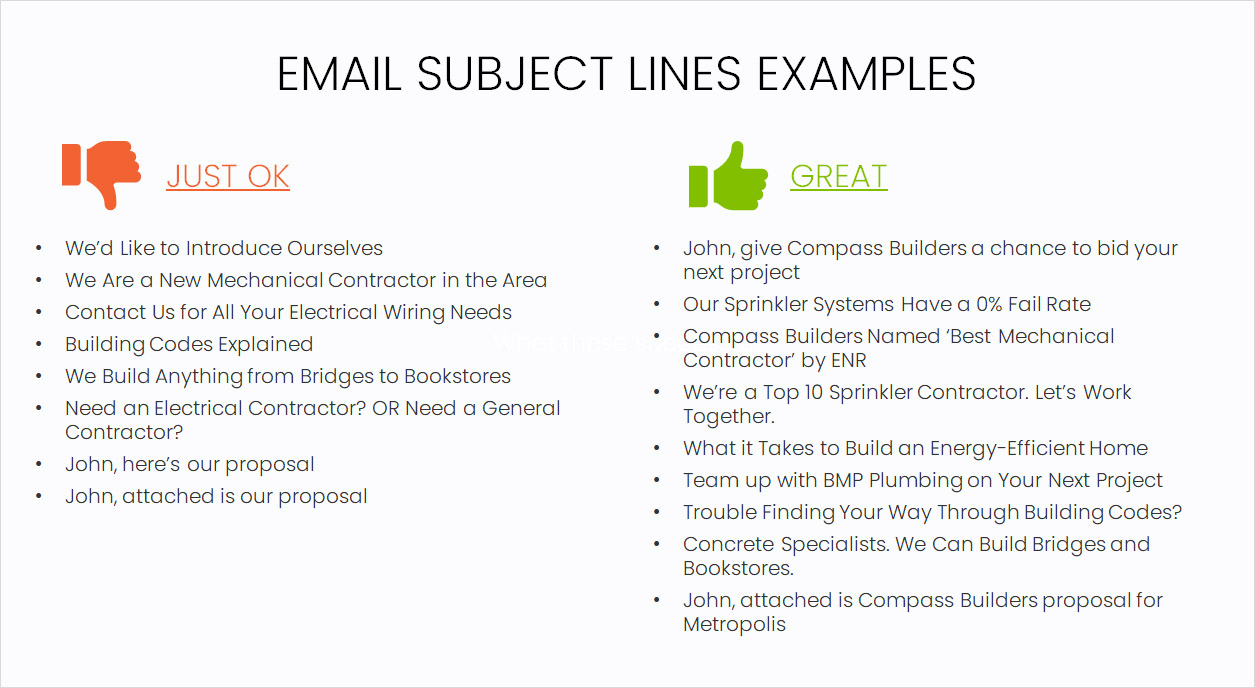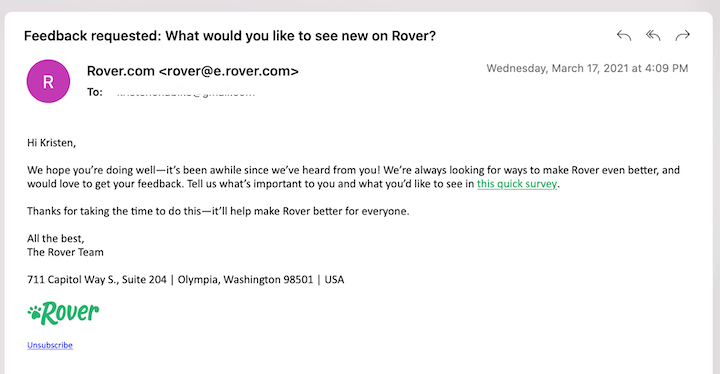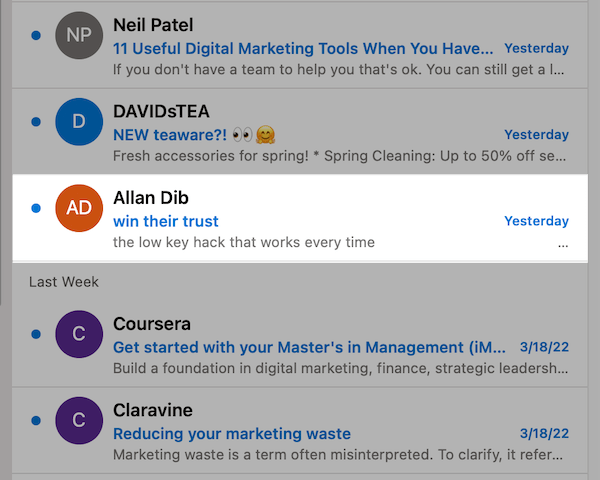Effective email subject lines are crucial for capturing attention. They set the tone for your message and can determine whether it gets opened or ignored.
Crafting the perfect subject line for formal emails can be challenging, especially when you want to convey professionalism and urgency. In this blog post, we’ll explore some prime examples of formal email subject lines. Whether you’re reaching out to a potential client, following up on a meeting, or sending a job application, the right subject line can make all the difference. By mastering the art of subject lines, you can enhance your email communication and achieve better results. We’ll also introduce you to Sender, a powerful tool that can help automate and optimize your email marketing efforts. Stay tuned to learn more about crafting compelling subject lines and leveraging top-notch email marketing platforms.

Credit: blog.hubspot.com
Introduction To Formal Email Subject Lines
A good subject line grabs attention. It makes people want to open the email. A clear and direct subject line is best. It tells the reader what to expect inside.
Important emails need strong subject lines. This builds trust and shows professionalism. A well-crafted subject line can set the tone for the whole message.
Subject lines affect email engagement. If the subject line is unclear, people might ignore the email. A good subject line can increase open rates.
Email marketing platforms like Sender help with this. Sender allows you to create effective campaigns. It uses automation and audience segmentation. This improves engagement and results.
Using Sender, you can track and analyze performance. This helps in refining your subject lines and content. Better subject lines lead to better engagement.

Credit: idealcrm.app
Key Features Of Effective Formal Email Subject Lines
Effective formal email subject lines clearly convey the email’s purpose. They often include specific details and maintain a professional tone. Examples can range from “Meeting Request: Project Update” to “Invoice Inquiry: March Billing”.
Clarity And Precision
A clear and precise subject line is crucial. It tells the recipient what the email is about. Avoid vague words. Be specific. Use simple language. This helps to grab attention quickly. Make it easy to understand. It saves time and avoids confusion.
Professional Tone
Use a professional tone in your subject line. This shows respect and seriousness. Avoid slang or casual language. Keep it formal. This builds trust and credibility. It reflects well on you and your organization.
Relevance To The Recipient
Ensure the subject line is relevant to the recipient. Know your audience. Address their needs or interests. This increases the chance of the email being opened. Make the content valuable to them. Show you understand their concerns.
Urgency And Actionability
Adding a sense of urgency can be effective. Use words like “urgent” or “important”. Encourage action with phrases like “respond by” or “action needed”. This prompts a quicker response. It highlights the importance of the email. Make it clear why they should act now.
Formal Email Subject Line Examples For Common Scenarios
Request a Meeting: “Meeting Request: [Your Name] & [Recipient’s Name]”
Job Application: “Job Application: [Your Name] for [Position]”

Credit: www.wordstream.com
Best Practices For Crafting Formal Email Subject Lines
Use short subject lines. Ideal length is 6-8 words. This helps in keeping attention. Avoid long sentences. Short subjects are easier to read.
Stay away from words like “free”, “deal”, and “win”. These can trigger spam filters. Use formal language. Avoid too many exclamation marks. Keep it professional.
Use the recipient’s name if possible. Make it feel personal. This builds a connection. Personal touches can increase open rates. But, avoid overdoing it.
Always test different subject lines. See which one works best. Use A/B testing. Analyze the open rates. Adjust based on results. Improve over time.
Pros And Cons Of Different Subject Line Strategies
Direct subject lines are clear and to the point. They tell the reader what the email is about. This can make the email easy to understand. Indirect subject lines are more subtle. They can create curiosity but may confuse some readers. Choosing between direct and indirect depends on the audience and the message.
A formal tone shows professionalism and respect. It is suitable for business and official emails. A friendly tone makes the email feel personal and approachable. This can help build a connection with the reader. Deciding on the tone depends on the relationship with the recipient.
Generic wording can apply to many situations. It is broad and not very detailed. Specific wording is detailed and precise. It tells the reader exactly what to expect. Specific wording can improve clarity and engagement. The choice between generic and specific depends on the email’s goal.
Conclusion And Recommendations
Select subject lines that are clear and direct to enhance email engagement. Tailor the subject to the email’s content for better results.
Summary Of Key Points
Sender is a tool for email and SMS marketing. It offers automation and audience segmentation. Key features include email campaigns, SMS marketing, analytics, and automated sequences. Integration with popular platforms is seamless. 24/7 customer support is available.Tips For Consistent Email Success
Use clear subject lines. Keep emails short and focused. Segment your audience for better results. Automate wherever possible. Track and analyze your campaigns regularly. A/B test subject lines and content. Ensure emails are mobile-friendly.Encouragement To Experiment And Learn
Try different approaches. Test new ideas. Learn from your results. Experiment with subject lines. Adjust based on feedback. Keep improving. Stay curious and innovative. “`Frequently Asked Questions
What Is A Formal Email Subject Line?
A formal email subject line is a brief summary of the email content. It sets the tone and indicates the purpose of the email.
How To Write A Professional Subject Line?
To write a professional subject line, be clear and concise. Use relevant keywords and avoid slang or informal language.
Why Is An Effective Subject Line Important?
An effective subject line grabs the recipient’s attention. It increases the chances of your email being opened and read.
What Are Examples Of Formal Subject Lines?
Examples of formal subject lines include “Meeting Request,” “Project Update,” and “Invoice Attached. ” These are clear and professional.
Conclusion
Crafting effective email subject lines can greatly improve your communication. Use clear, concise language to capture attention. Keep your audience in mind and tailor your subject lines accordingly. For more advanced email marketing tools, consider using Sender. This platform enhances your campaigns through automation and audience segmentation. With Sender, you can easily manage your email and SMS marketing. Get started today and see the benefits for yourself. Happy emailing!

